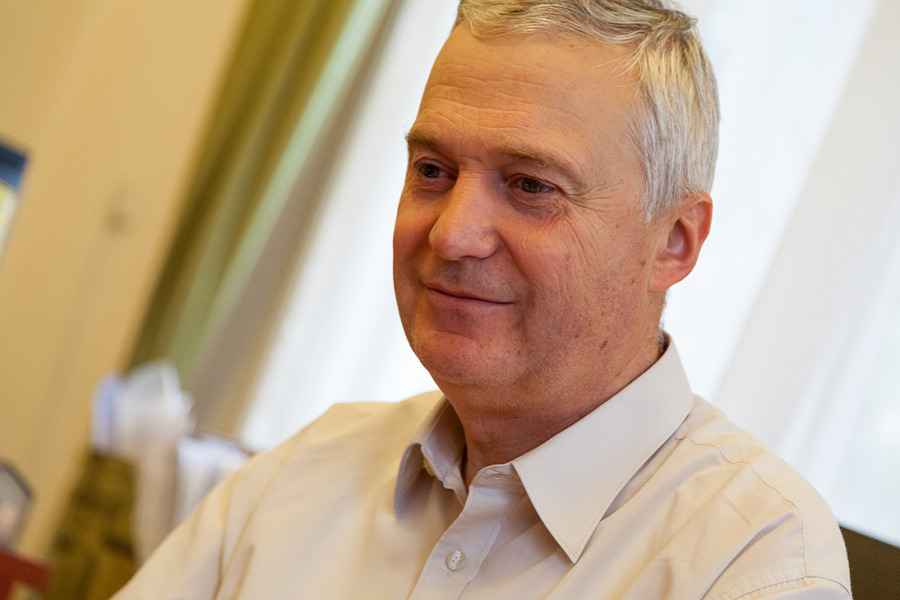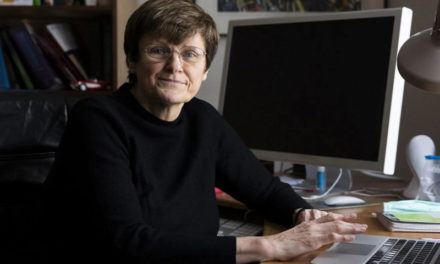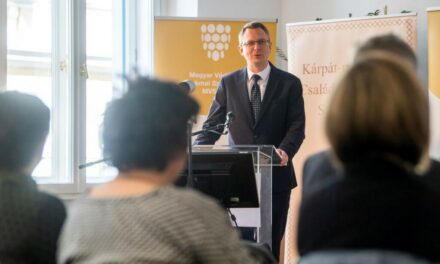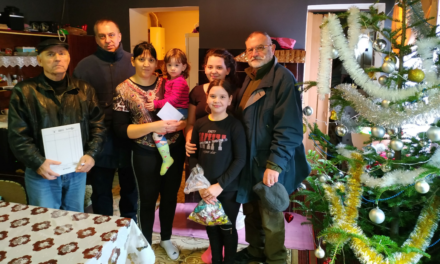Visually impaired people are not a separate group in society, we live our lives in the same way as many of our fellow human beings with the difficulty of not seeing, said Sándor Nagy, president of the Hungarian Association of the Blind and Visually Impaired (MVGYOSZ).
MVGYOSZ was the most recent beneficiary of the Good to Be Good campaign at the end of last year. What did the support mean in the life of the organization?
We experienced a double result. By appearing in the media, we were able to introduce ourselves, and society got to know us and our work. All of this is important because we were able to emphasize: visually impaired people are not a separate group of society, we live our lives in the same way as many of our fellow human beings with the difficulty of not seeing. We have to compensate for our deficiency, and if this is done well, we can live our lives in the same way as other members of society. Compensation can be personal or material assistance. The other, also very important, benefit of appearing in the charity action is that it obtained significant resources to maintain the association's services. We also had serious conflicts in this area, because several visually impaired individuals expected to solve their individual social problems by disbursing the amount of donations received during the campaign. Several of our member associations also did not understand that the amount received cannot be spent on the maintenance of the member associations.
Why not?
The association wants to use the money to help all visually impaired people, in order to provide them with many services.
What services are available through the association?
We operate an auxiliary equipment store, where we welcome visually impaired customers with a range of talking and tactile devices (for example, a talking blood pressure or blood sugar meter). I can mention the Távszem service or our Future Perspectives program, in the framework of which, for example, we provide teachers with useful information to facilitate the learning of visually impaired students. From students to elderly people with visual impairments, we help our fellow human beings by providing textbooks and library services in braille, electronic and audio book formats. We help with the training of guide dogs. We carry out serious advocacy work, we monitor problems related to accessibility, we cooperate with the Hungarian government and local governments, and we give opinions on the parts of the legislation that affect us. In other words, we patronize the learning, training, information acquisition, culture, and everyday life of all visually impaired people.
Do member associations not provide services?
Of course, certain services are also provided by the member organizations, which are also used by their members. At the same time, several visually impaired people believe: they don't read books, don't require the Távszem service, don't shop at the aid store, instead they want to have fun, feel good and go on trips. Why not use that money for such purposes, they asked.
I was struck by what he said: the program "It's good to be good" drew society's attention to the fact that visually impaired people living in society are not an isolated group. Wasn't that the case before?
Perhaps I worded it imprecisely, since many people are obviously aware that there are many visually impaired people, I rather thought that the program helped them to learn about our situation. How we live our everyday lives, how society can help us to make our lives more comfortable.
The majority should not consider visually impaired people as special people, miracles, but let them get to know us, because we are the same people as the majority of people in society: we live, study, work, have a family, and raise children in the same way.
We managed to express ourselves about certain stereotypes, such as that visually impaired people hear better than other people. We don't hear better, we just prioritize hearing to get information. Another stereotype is that blind and partially sighted people are all good musicians, no, there are some of us who are really talented in music, just like the sighted.
It is a similar misconception that visually impaired people are smarter than sighted people, this is not true either, it is true that we are forced to store information in our brains, so we memorize better (more).
A sighted person does not have to memorize essentially anything, because the information is constantly displayed in front of him. We are not more diligent either; we, who live among the visually impaired, know that there are more casual, more irritable, less intelligent or educated among us, that is, the situation is the same among the blind as in the sighted society. In the program, it was also emphasized that assistance should be offered, that they should ask if they can help, and that the visually impaired person should be able to ask if he takes advantage of the opportunity offered.
Hasn't this been done in a similar way so far?
My experience is that since the campaign, more people have offered their help, and when we say thank you very much, we are doing well, those who offer help are no longer offended. Nowadays, it is easier to accept if we do not demand their offering.
How much money did the association get with the help of the show?
A total of HUF 180 million was received from monetary and in-kind donations. Valkyr Informatikai Kft., for example, built the IT system in our headquarters in Hermina út, which is under renovation.
The Art Nouveau villa has been under renovation for quite some time. When is the work expected to be completed?
Unfortunately, the renovation took a long time, and we could not avoid the rise in energy and building material prices, as well as the lack of building materials, which also affected Hungary as a result of the Russian-Ukrainian war. On the other hand: previously, during socialism, the monument building was combined with a modern building, which was demolished at the beginning of the renovation. It was then that we realized that the rear tract of the Art Nouveau villa - which was not revealed during the preliminary excavations - was painted completely differently before construction. Its facade was as elegant as in several parts of the building, with windows and arched doors. Therefore, a new authorization procedure was necessary so that the rear front could also regain its original appearance, which entailed additional costs and an increase in the duration of the renovation.
In the name of accessibility, an elevator had to be planned in the building, but it was not known where the iron beams run in the ceiling, this was also revealed during construction. The elevator had to be placed half a meter away and turned ninety degrees. Again, this only involved additional costs and new licensing. We have been trying to validate our request for additional funds for a year and a half, and it is still being evaluated.
So is the job currently on hold?
No, because we bridged the non-payment of additional costs by bringing certain works forward and paying them. This includes electrical work or furnishing the building. As soon as we get the funds required due to the additional cost, we can complete the remaining facade and interior design works.
Can they take possession of the building this year?
If all goes well, we can move back this fall.
When the building is completed, will new services be available?
We are not thinking about new services for now, we are developing the existing ones. For example, the operating system of our Távszem service, so that users of special BlindShell smartphones with push buttons designed for the visually impaired can also use Távszem. We have developed our audio library service in such a way that books can be read not only in audio book format or with braille, but also in digital format, in such a way that the interested party can "read" on a computer with the help of a text editor, or by downloading the file using a Braille display. For this purpose, we would like to purchase Braille displays and lend them together with the works to be read.
The devices can also be purchased with the help of subsidies offered in the program "It's good to be good".
We also eliminated the huge CD file that takes up a lot of space, the audio files are uploaded to a database for online listening. The works read aloud are copied to a device and sent to the library member.
Will they be able to develop the guide dog training center?
We constantly ensure that the trainers can work in suitable working conditions: the kennels necessary to keep the dogs, the training ground, the animal recovery room, the trainers' workstations all give the association a task. At the moment, we have to renovate the rainwater drainage system, which is also very expensive.
Recently, a strange incident stirred the mood: the association's name came up in connection with the investment of a private hospital for the disabled, which provides free care and is planned for Lengyeltóti. What exactly happened?
We had to distance ourselves from the phenomenon, because the organization announcing the investment uses the phrase "blind and visually impaired" in its name, which may have caused misunderstanding, since this phrase is used not only in the name of the association, but also in the name of our member organizations. Moreover, their abbreviation is exactly the same as the abbreviation of our previously excluded Fejér County organization, from which many mistakenly concluded that the initiative was created under our auspices. I also hereby deny that we have anything to do with the organization; in addition, the organization in question previously collected donations for causes that MVGYOSZ had previously implemented.
More joyful events also took place, for example the development of the Vakok garden in Városliget.
There is a huge demand for the park, several of our county organizations regularly organize trips to the Garden of the Blind, so we strive to extend its operating time. We would also like to buy new sports equipment and mobile garden furniture so that even groups can visit and have a picnic. We also spend the amount collected during the Being Good is Good campaign for this.
During the spring, the European Commission (EC) conducted a survey in connection with the European Disability Card. Does the association have information on what conclusions were drawn from the responses received?
All we know is that the European Commission considers it appropriate to introduce the card in the Union, and it is expected that they will deal with the issue in the fall. The EC would like to ensure that the card is uniform, because currently the member states do not offer the same discount to the needy. In Hungary, for example, people with disabilities benefit from very serious discounts, while in other member states, for example, travel is less subsidized and a smaller amount of support is provided more widely.
Emperor Tamás
Featured image: Perhaps Csaba / Origo












